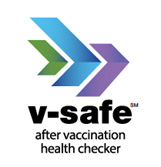After Your COVID-19 Vaccine
Receiving a vaccine is an important step toward protecting yourself and others from COVID-19. The information on this page may help you navigate any questions or next steps following your vaccine appointment.
COVID-19 Vaccine Symptoms You May Experience
It’s normal to experience mild side effects after receiving your COVID-19 vaccine. These are signs that your body is building protection against the virus. These symptoms may last up to 36 hours. If you experience a severe side effect or you feel you are having an allergic reaction, please call 911 immediately.
If you have received the Johnson & Johnson vaccine and develop severe headache, abdominal pain, leg pain, or shortness of breath within three weeks of vaccination please contact your health care provider.
When to Call Your Doctor
| Normal and Expected Side Effects | What Should You Do? |
|
|
| Abnormal or Adverse Side Effects | What Should You Do? |
|
|
You may also report your adverse side effects directly to the FDA/CDC by calling 800-822-7967 or online at vaers.hhs.gov/reportevent.html. Remember, side effects may feel like flu and even affect your ability to perform daily activities, but they should go away in a few days.
How can I track and report side effects from the vaccine?
Following your vaccine, you'll receive a link to access the “V-safe After Vaccination Health Checker” application for your phone. Through the V-safe app, you can quickly tell the CDC if you have any side effects after getting the COVID-19 vaccine. The CDC may follow up by phone to get more information.
Enroll with v-safe

V-safe is a smartphone-based tool that uses text messaging and web surveys to provide personalized health check-ins after your vaccination. Through v-safe, you can quickly tell the Centers for Disease Control and Prevention (CDC) if you have any side effects after getting the vaccine. Someone from CDC may call to check on you depending on your answers. V-safe will remind you to get your second COVID-19 vaccine dose if you need one.
Sign up with your smartphone’s browser by visiting vsafe.cdc.gov.
After I get the vaccine, am I contagious?
No. The COVID-19 vaccines contain deactivated proteins and will not cause you to be contagious, rather they trigger your natural immune response. However, you should still take ACTion to protect others even after you’ve received a first or second dose. Please make sure to continue wearing a mask, physical distancing, and avoiding large gatherings when outside your household to limit asymptomatic spread.
This is especially important in the rare chance an individual has been infected with COVID-19 just prior to or just after receiving a vaccine.
If I had a reaction to the first dose, can I still get the second dose?
Unless you had an immediate allergic reaction within four hours of receiving the first dose (hives, trouble breathing, tongue/lip swelling, anaphylaxis), you should receive the second dose with an observation period of 30 minutes afterward. Vasovagal reactions (dizziness, fainting, low blood pressure) are expected post-vaccination side effects are not contraindications to receiving the second vaccine dose. You can also talk with your healthcare provider about allergy testing before receiving the second dose.
Are there differences between the first and second doses? Can I skip the second?
Among two-dose COVID-19 vaccines, FDA Emergency Use Authorization currently states both vaccine doses should be given separated by 21 days (Pfizer) or 28 days (Moderna) to reach up to 96% efficacy against the virus. In order to protect yourself and your family to the fullest extent of the vaccine, it is important that you receive both doses of the vaccine within the recommended timing interval. No matter which vaccine you are given, both doses are the same.
Will the COVID-19 vaccine cause me to test positive on a COVID-19 viral test?
No. Vaccines currently in clinical trials or under emergency use authorization in the United States will not cause you to test positive on viral tests, which are used to see if you have a current infection.
If your body develops an immune response, which is the goal of vaccination, there is a possibility you may test positive on some antibody tests. Antibody tests indicate you had a previous infection and that you may have some level of protection against the virus. Experts are currently looking at how COVID-19 vaccination may affect antibody testing results.
How long will my immunity last after I receive a COVID-19 vaccine?
After receiving a full recommended dose of COVID-19 vaccine, antibodies will develop in your immune system. This process usually takes about three weeks. Current evidence shows antibody levels will decrease after several months. However, this still provides a level of infection prevention and will contribute significantly to herd immunity throughout our community.
I might have been exposed to COVID-19. Should I quarantine?
Even if you are fully vaccinated, you should quarantine if you are experiencing symptoms similar to COVID-19. If you are not fully vaccinated, you should quarantine to protect others under the following circumstances:
- You have been in close contact (more than 15 minutes at less than six feet apart or with direct physical contact) with someone who has tested positive for COVID-19.
- You have been in close contact (more than 15 minutes at less than six feet apart or with direct physical contact) with someone displaying COVID-like symptoms linked to a confirmed COVID-19 case.
How can I better manage COVID-19 stress?

COVID-19 has introduced new forms of stress into our lives. While we can't always eliminate our life stressors, we can change how we react to these challenges.
Learn how to better manage the stress in your life with our helpful Resilience Toolkit, which can guide you to the root of your feelings and help you cope with stress in more positive ways.
I’m planning a vacation. What do I need to know?
Even if you are fully vaccinated, non-essential travel increases your chance of COVID-19 exposure and the potential for spread. If you choose to travel, take steps to protect yourself and others. Even though other states may have fewer restrictions, it’s important to practice the same safe gathering practices we follow here in northern Michigan and adhere to the safe-travel guidelines set forth by the CDC:
- If you are eligible, get fully vaccinated for COVID-19.
- Before you travel, get tested with a viral test 1-3 days before your trip.
- Wear a mask over your nose and mouth when in public.
- Avoid crowds and stay at least 6 feet/2 meters (about 2 arm lengths) from anyone who did not travel with you.
- Get tested 3-5 days after your trip and stay home and self-quarantine for a full 7 days after travel, even if your test is negative. If you don’t get tested, stay home and self-quarantine for 10 days after travel.
- Follow all state and local recommendations or requirements after travel.
- Do not travel if you were exposed to COVID-19, you are sick, or you have tested positive for COVID-19.
- Masks are required on planes, buses, trains, and other forms of public transportation traveling into, within, or out of the United States and in U.S. transportation hubs such as airports and stations.
- Avoid crowds as much as possible, indoors and outdoors.
- Wash your hands frequently especially before eating and after being in public areas.
- Bring extra supplies of masks and hand sanitizer.
- Cook or bring your own food, get carryout, or eat outdoors where you can maintain distance from others.
- Consider staying separately from other households rather than staying with friends or family.
Continue to ACT
Even after receiving a vaccine, you must remain diligent about following COVID-19 safety precautions until herd immunity or “community immunity” is achieved in our region. Here are some ways you can continue to Avoid COVID-19 Today (ACT):
- Mask up when you’re out in public
- Wash your hands frequently with soap and water (20 seconds does the trick)
- Physically distance from people outside your household
- Follow your doctor’s advice and get recommended appointments, screenings, and treatments to help keep yourself healthy.
Additional CDC Guidance
The CDC has released interim public health recommendations for fully vaccinated people in non-healthcare settings. Find the latest updates here.
Download Immunization Records from the MDHHS Michigan Immunization Portal
If you’re age 18 or older and have been immunized in Michigan, you may be able to download your Immunization Record from the Michigan Care Improvement Registry (MCIR).
Visit the Michigan Immunization Portal at michigan.gov/immunize or Michigan.gov/MiImmsPortal to locate any existing record within MICR that matches your government-issued photo ID. Examples of acceptable ID include:
- Driver’s License
- State ID
- Passport
To maintain privacy, you will be asked to create or sign in to your MILogin account and upload photo ID. Your immunization record will appear as a .pdf document you may download, save, or print.
If an immunization record can’t be found, please reach out to your primary care provider’s office or local health department. Parents of children under 18 should also request immunization records from your child’s physician or a local health department.
Stay Connected
Did you know we have a blog and an email newsletter? Get our helpful, “healthful” content and important COVID-19 updates delivered right to your inbox!
